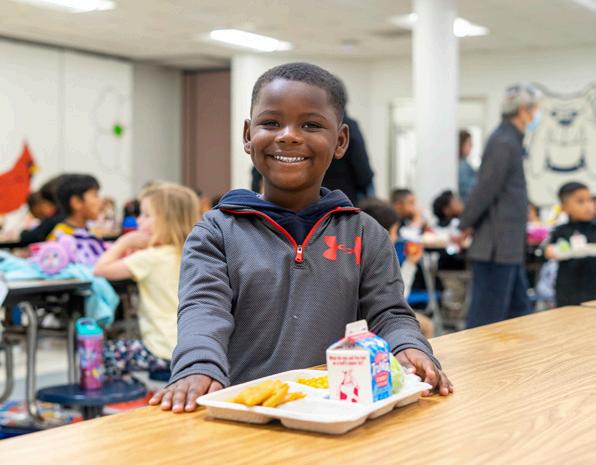
3 minute read
CENTERING STUDENTS IN SCHOOL NUTRITION
DPS students help district craft menus that resonate with peers
im Keaten and Dr. Linden Thayer are utilizing the privilege of school nutrition leadership to do more than just feed students in Durham Public Schools. The director of school nutrition and assistant director for food systems planning are centering student voices in order to provide sustenance that satiates hunger and feeds the mind. They hope to elevate the school breakfast and lunch experience by listening actively to the ones who are actually eating the food being ordered, prepared, and served in DPS kitchens every day. They are soliciting feedback, thoughts, and ideas from student leaders like the members of Dr. Pascal Mubenga’s Superintendent’s Student Advisory Council, members of the Hillside student community, as well as outside youth advocacy organizations such as Student U and Pupusas for
Advertisement
Education, to get feedback on current operations as well as develop a vision for the future of school food. Keaten’s team is taste-testing menu items like Asian dumplings with teriyaki sauce and new vegetable blends, hosting brainstorming sessions, and holding space for concerns around everything from portion sizes to the cultural relevance of menu items.
Keaten and Thayer are also conducting informal community conversations to bring school food and nutrition to the forefront of our students’ in-school experience, and have received positive anecdotal messages about the improved meals. During one informal conversation, a high school student told them that the dumplings were tasty but they needed dipping sauce. A sauce was then added to the menu.
“We’re excited to engage,” said Keaten, who added that his department is committed to more family and parental involvement as well. “We want to be a part of this community, and continue to offer things that meet their needs.”
People’s needs change over time, added Thayer. “We need to continue to evolve to meet the needs,” she said. “For example, we have to take on allergies and dietary restrictions in a more holistic way. We have to take on issues that are salient to our student population, like the climate crisis and health disparities.”
That evolution in DPS school food includes expanded partnerships with the Durham County Department of Public Health’s DINE (Durham’s Innovative Nutrition Education) program, which sends food specialists into schools and the community to conduct nutrition lessons, provide hands-on cooking experiences, and teach the history and origin of certain foods. Designed and implemented by the public health department, the program is supported by funds from both SNAP-Ed and Durham County.
In addition to partnerships that help students and the community embrace good nutrition, DPS hosts special events and initiatives like National School Lunch Week (October) and National School Breakfast Week (March) to celebrate and recognize the importance of healthy eating, and events like NC Crunch Day (October) and Taste of NC Day (January) to showcase North Carolina-grown products and producers.
DPS is shifting priorities and values in other ways in its operations. Examples of these changes include prioritizing professional development for staff, participating in DPS Maintenance & Environmental Services and Don’t Waste Durham’s pilot recycling program, and considering how to implement reusable trays and serviceware. Recent USDA grant funding will also facilitate the purchase of an additional $122,000 in local and regional products for programs between January 2023 and March 2024.
Keaten and Thayer ensure that the district’s school nutrition department is represented and participates in a host of wellness, career, food security, and food production spaces within DPS and in the greater Durham community. Keaten co-facilitates the DPS SHAC (Student Health Advisory Committee), and Thayer participates in the Durham Food Security Network and County-City Food Security Team. Keaten and Thayer are cultivating partnerships with local and regional food producers and distributors to lay the groundwork for future mutually beneficial partnerships.
The department represents a large, reliable institutional buyer for local and regional products, which is key for healthy growth of local and regional producers, aggregators, and value-added processors; at the same time, as DPS looks to a different food future with many more scratchmade items, DPS school food needs to build up the farmer and producer base to support those scratch-cooking efforts. Early pilot menus have incorporated local products from Farmer Foodshare, Firsthand Foods, Guglhupf Bakery, and Lantern Restaurant, to name a few; conversations are continuing to happen with farmers large and small, from the Black Farmers Market to Dawnbreaker Farms to Piedmont Microgreens, about how DPS school food can be a positive player in a healthy regional food system.
Keaten and Thayer believe that food is a central part of the larger conversation in our district around equity, wellness, and belonging. They are committed to listening, learning, and acting for positive change in school food, and through school food; and they are committed to student leadership in this work.
For students and families interested in learning more and engaging in these efforts, please contact Dr. Linden Thayer ( linden_thayer@dpsnc.net ).







